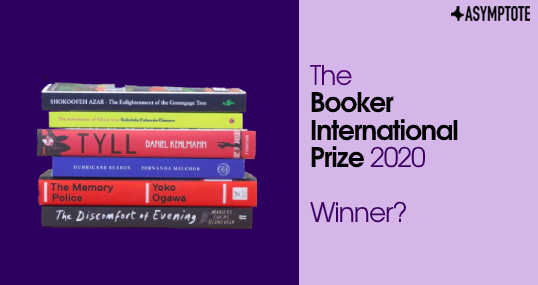Asymptote’s momentous fortieth issue features brand new work from thirty-two countries, a Dutch Literature Special Feature curated by 2020 International Booker Prize co-winner Michele Hutchison, and a literary roster spanning classics like Tagore, heavy hitters like Harwicz, and rising stars like Fabias. Dizzy yet? We’re here to help.
In the Chinese language, we never use the abstract noun of beauty. Instead, beauty is always a quality, a trait something possesses. There is, for example, no real way to express the notion that “beauty is all around us”; instead, one would say, “everything here is beautiful.” I find something wondrous in this distinct nature of what beauty is. It is a wandering state, a constantly mutating definition, a metamorphosing form that adapts to whatever subject it is applied to—never fixed, never permanent. Something is beautiful not for its appeal to the pure nature of beauty, but for its unique addition to the myriad of beauty’s appearances.
I was once again reminded of this definition while reading through the Fall 2020 issue, in which the writings from thirty-two countries have compiled and allowed the contours of literary beauty to vacillate and transmit. The various Englishes that evolve via translation do not subscribe necessarily to the English that certain texts are born to, instead bringing the colours and geometries of their own language, imparting a distinct and knowing pleasure. In Stella N’Djoku’s poems, the brief lines are vehicles for a cyclical musicality, emphasized by the rhyming Italian but also vivid in the tender translation of Julia Pelosi-Thorpe, sensitive in their lineation. The verses are potent with grief, but positions it within the great immeasurability of the world—creating a familiar dwelling for grace amidst pain, and the poem as our path towards that space.
As if yesterday today tomorrow
were not places
and were here now
in centuries.
In the two poems of Kashimiri poet Nādim, one is also reminded of the singular iterations of his the poet’s original language. As translator Sonam Kachru informs us in his translator’s note, “[Nādim] is thinking of [Kashmir’s] history—a history revealed, in part, through the history of its poetry.” There is then, an impression that we are not privy to when reading in translation, yet the poem still transmits the meditative, majestic quality of scanning the poetic horizons for something that reverberates from the past into the present, and back again. The stoic power of lines like:
I will not sing—
I will sing today no song of Nishat or Shalimar, no annealed song of waters
engraving terraced gardens, no bower songs of bedded flowers;
No soft songs flush or sweetly fresh, not green dew songs
nor songs gentle and growing—








